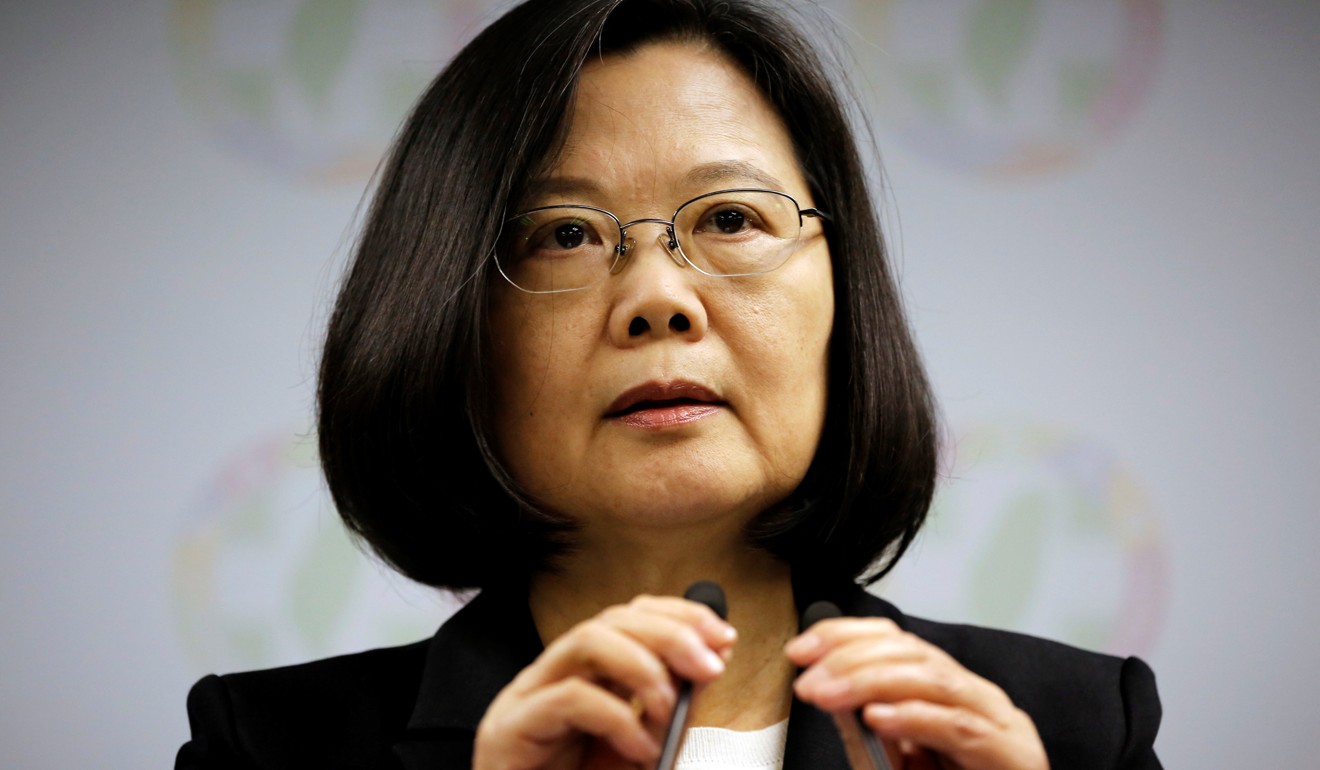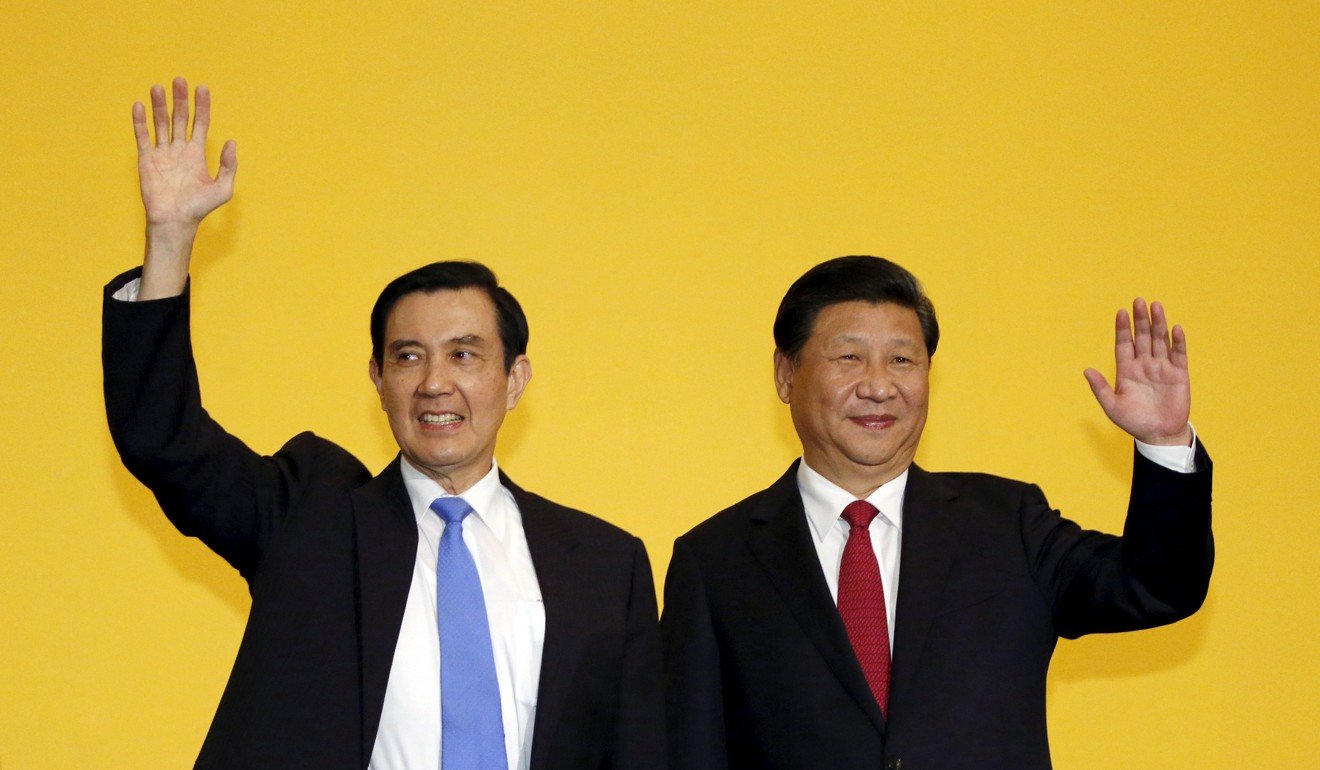
Taiwan elections may give economy brief boost as US-China trade war threatens tech sector
- The gains made by the Beijing-friendly KMT in Saturday’s elections may help improve ties with mainland
- But longer term, the trade war and troubles in Taiwan’s electronics industry will continue to weigh on growth
Crushing local election defeats for Taiwan’s ruling party are expected to offer short-term respite to an economy that is otherwise “on a knife edge”, analysts say.
The Democratic Progressive Party suffered losses across the country at the hands of the Kuomintang, or KMT, which is seen as more friendly to Beijing, at a time when Taiwan is battling against a cyclical downturn in global consumption and heavy exposure to the US-China trade war.
The direct economic implications for the economy are likely to be minimal, given the business-friendly approach of both sides and the cross-party consensus on the importance of foreign investment in the Taiwanese economy.
The results may, however, help usher in a realignment in Taiwan’s policy back towards China after a tense few years in which the relationship has become increasingly sour.
After rout at the polls, will Tsai heed message from voters?
The KMT won 15 of the 22 mayoral and county magistrate jobs up for grabs in Saturday’s elections, reversing a majority captured by the ruling DPP in 2014.
Unlike the independence-leaning DPP, the party has endorsed Beijing’s one-China policy, which it regards as a pre-condition for cross-strait dialogue.
Under the former KMT president Ma Ying-jeou the two sides were able to strike 23 deals on trade, transit and investment that bound export-reliant Taiwan more closely to the mainland’s US$12 trillion-plus economy.
But since President Tsai Ing-wen took office in 2016 the deal-making stopped.
There is now an expectation that relations between the mainland and Taiwan will improve because of the election results, helping the economy, said Liang Kuo-yuan, president of the Polaris Research Institute, a think tank in Taipei.
Economic improvement was the top concern of voters on Saturday, followed by mainland-Taiwan relations, said Chao Chien-min, dean of social sciences at Chinese Cultural University in Taipei. Voters have said they want higher wages and better infrastructure in their hometowns.

However, the longer-term prospects are less rosy. Taiwan’s economy is slowing rapidly and voters appear to have railed against the “lacklustre economic performance” under Tsai, who has resigned as DPP chairwoman.
“This has been exacerbated by deteriorating links with China, Taiwan’s largest trade partner. Political uncertainty will dampen investor sentiment going forwards, dragging on private investment,” said Carlos Casanova, Asia Pacific economist at insurer Coface.
Growth in real gross domestic product slowed to 1.5 per cent in the first half of 2018 from 4 per cent in the second half of 2017, fuelling economic anxiety among voters.
“The pace of annual growth since about 2014 has been closely correlated to trade with mainland China. Thus one may see why voters might want to forge closer ties to the mainland,” said Steven Cochrane, chief Asia-Pacific economist at Moody’s Analytics.
UBS said in a research note last week that it expects GDP growth in Taiwan to slow from 3 per cent this year to 2.6 per cent in 2019. Meanwhile, Fitch Ratings has cut its 2019 GDP growth forecast to 2.4 per cent in 2019.
Taiwan election lost on local issues, not relations with mainland
At the crux of this slowdown are Taiwan’s electronics companies, which account for about one-third of national exports and which dominate the economy.
Sluggish demand for smartphones and a cyclical downturn in Taiwan’s crucial semiconductor industry have dampened growth.
US research company Gartner has forecast that the global semiconductor market will shrink by 1.6 per cent in 2019, after three years of uninterrupted growth.
And the entangled technology supply chains of mainland China and Taiwan have dragged the island into the ongoing trade war with the US.
An escalation of the dispute, especially the threat to raise tariffs on US$200 billion of Chinese products from 10 per cent to 25 per cent in January, could weigh on parts of the Taiwanese tech sector such as semiconductor and component makers.
“I would say the trade war is a major risk that will probably counteract or play down any positive sentiment that comes out of this election,” said Eleanor Olcott, China policy analyst at the research firm TS Lombard, who described the trade war as the “greatest headwind” for Taiwan’s economy.
Compounding matters is the fact that in recent years, low-cost manufacturers in mainland China and Vietnam have been snapping at the heels of Taiwan’s hi-tech economic base, as they rapidly upgrade their technological capacity.
“Taiwan’s economy feels like it’s on a knife edge, because it has other countries competing for key, core industries.
“Taiwan occupies a minute corner of the supply chain, where you have very hi-tech and innovative components. China has been actively trying to take over these sections of the supply chain. It [Taiwan] is being slowly muscled out by national competitors,” said John Marrett, Asia analyst at the Economist Intelligence Unit.

In another worrying sign for Taiwan’s economy, Taipei-based Foxconn Technology Group, the world’s largest electronics contract manufacturer, has seen its share price drop more than 8 per cent in recent weeks.
The company, formerly known as Hon Hai Precision Industry, is one of China’s largest employers and the main supplier for Apple’s iPhone.
The stock prices of Apple suppliers have been hit hard recently on reports the company had slashed orders substantially for its new iPhone models.
On Thursday, Bloomberg News, citing a company memo, reported that Foxconn plans to reduce its costs and cut 10 per cent of its non-technical workforce as it expects 2019 to be a “very difficult” year.
Foxconn told local media in Taiwan on Friday that it planned to reduce costs next year, but dismissed reports it planned to make “huge cost cuts”.
Analysts differ in their views of the potential drag on Taiwan’s economy that any cut in Foxconn’s spending would have.
Livelihoods the real winner in Taiwan polls, not ideology
“The news about Foxconn’s lay-offs is negative for the iPhone supply chains and the broad outlook of Taiwan’s electronics industry,” said Ma Tieying at DBS.
“The impact of Foxconn’s planned expenses cuts on Taiwan’s economy will likely be small,” argued Chang Liu, an analyst at Capital Economics. “My understanding is that most of the company’s factories are based outside of Taiwan.
For example, 30 per cent of the reported spending cut will apparently come from the company’s iPhone unit, which I believe is located in Shenzhen. By contrast, Foxconn’s operations in Taiwan, such as R&D, reportedly, won’t be affected by the cuts.”
Nonetheless, the rumours may be viewed as a bellwether for what’s expected to be a slow year for some of Taiwan’s key industries.
“It wouldn’t be a big surprise [if Foxconn were to slash its spending]. We’re at the top of the hi-tech consumer goods cycle right now,” said Marrett at the EIU. “If Foxconn is thinking this way, what is it saying in terms of how that industry is looking and what’s going to happen next year?”
Additional reporting by Chad Bray


